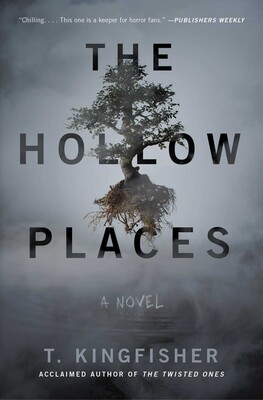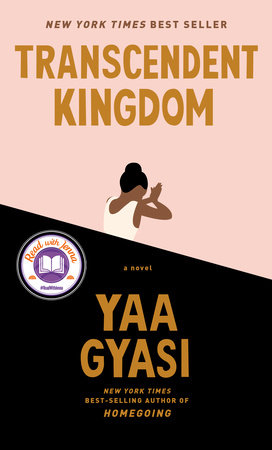
The Hollow Places by T. Kingfisher
The Hollow Places opens with a life in turmoil. T. Kingfisher introduces us to her protagonist, Kara (also known as Carrot), as she moves into her uncle’s museum of oddities following a disruptive divorce. The nostalgic setting and friendly faces help put her at ease, but a disturbing discovery shows her that terror is right around the corner or, more precisely, through a strange hole that appears in a wall of her uncle’s beloved museum. Inside of this opening, Kara discovers a passage to another world.
The Hollow Places follows Kara and Simon, an eccentric barista from a neighboring coffee shop, as they try to make sense of the haunting landscape on the other side of the wall. Both characters have vibrant personalities and charming wit that brilliantly contrast with the otherworldly terrors lurking on the other side of the wall. Small details like Kara’s fanfiction fascination and Simon’s bizarre Florida heritage make them feel grounded, which adds a level of relatability to every horrifying encounter.
The setting, whether in this world or beyond, is expertly crafted. From a wide collection of taxidermied animals hanging on the walls to the unnerving sparsity of the other world, every location, no matter how strange, is easy to imagine. Kara’s casual narration style and artistic sensibility helps emphasize these details and make the horror more personal. For anyone looking for a truly unervering horror story with endearing characters and genuine sense of humor, The Hollow Place delivers.
-Evan Mortimer

Transcendent Kingdom by Yaa Gyasi
Gifty, the narrator of Yaa Gyasi’s Transcendent Kingdom, spends her days observing mice in a Stanford lab, and in the evenings, returns to the apartment where her mother lies in a depressive trance, unable to get out of bed. Both Gifty and her mother remain hobbled by the loss of Nana, Gifty’s older brother who died of an overdose when Gifty was still a young girl.
The passages detailing Nana’s deterioration from star athlete to opioid addict are the novel’s most compelling. That Nana comes across so strongly as a character is a testament to how closely the novel’s form cleaves to Gifty’s point of view. Just as Gifty’s life is oriented around her attempts to understand her brother’s illness, so the novel turns on the axis of their shared past. Gyasi chronicles the devastating pivots of Nana’s addiction with an attention both scientific and humane. Despite its laboratory setting and interest in exploring addiction through a neuroscientific lens, Transcendent Kingdom indicts the notion that the quest for scientific understanding is separate from our emotional needs.
As she attempts to reconcile the events of Nana’s life, Gifty must also contend with her attraction to both the investigative principles of her research and the zealous devotion to Christianity that she harbored as a child. The questions opened by these competing perspectives – about faith and fact, known and unknown, ingenuity and intrigue – are the questions of great novels. Transcendent Kingdom asks them with artfulness and earnest curiosity, and in doing so, invites the reader into its greatness.
-Sofia Montrone
